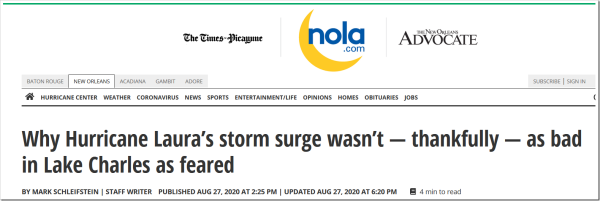https://notalotofpeopleknowthat.wordpress.com/2020/08/28/hurricane-laura/
By Paul Homewood
Fortunately, the damage from Hurricane Laura has turned out to be much less than originally predicted, although wind damage in and around Lake Charles, which bore the brunt, is still massive:
https://www.nola.com/news/hurricane/article_9d69f56e-e88d-11ea-b1f5-a35013378fd2.html
https://www.bbc.co.uk/news/world-us-canada-53921285
Laura made landfall with estimated wind speeds of 130 Kts, though as is often the case satellite data suggests lower speeds of around 120 Kts:
https://rammb-data.cira.colostate.edu/tc_realtime/products/storms/2020al13/dgtldvo
However, ground data puts winds at no more than 101 mph, which was at Cameron, where Laura made landfall:
https://www.nhc.noaa.gov/archive/2020/al13/al132020.public_a.029.shtml?
There is talk of Laura being the most powerful storm to hit Louisiana, but this is meaningless given the number of states where hurricanes can hit. Interestingly though, according Philip Klotzbach Laura’s wind speeds tied with the Last Island hurricane, which hit Louisiana in 1856.
Nationally, there have been thirty Cat 4 and 5 hurricanes since 1856, and undoubtedly others will have gone unrecorded in the early years:
https://www.aoml.noaa.gov/hrd/hurdat/All_U.S._Hurricanes.html
Although there have been four since 2017, you have to go back to Charley in 2004 to find the previous one, and evidence of bunching is apparent in earlier periods.








